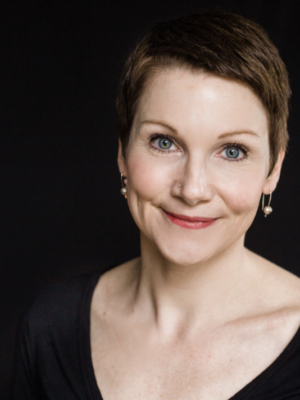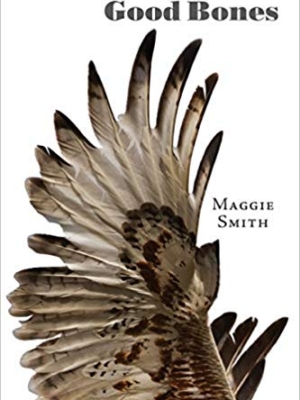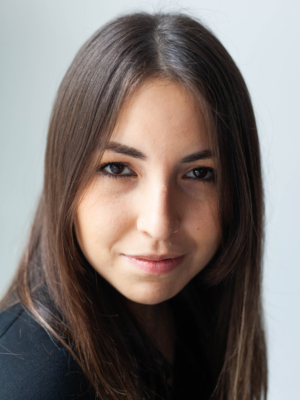Maggie Smith, Poet
 Maggie Smith is the author of three books of poetry: Good Bones (Tupelo Press, 2017), The Well Speaks of Its Own Poison (2015), and Lamp of the Body (Red Hen Press, 2005). Smith is also the author of three prize-winning chapbooks. Her poems have been widely published by renown names like Best American Poetry, the New York Times, The New Yorker, Tin House, POETRY, The Paris Review, amongst others.
Maggie Smith is the author of three books of poetry: Good Bones (Tupelo Press, 2017), The Well Speaks of Its Own Poison (2015), and Lamp of the Body (Red Hen Press, 2005). Smith is also the author of three prize-winning chapbooks. Her poems have been widely published by renown names like Best American Poetry, the New York Times, The New Yorker, Tin House, POETRY, The Paris Review, amongst others.
Recipient of several prizes, fellowships, and awards, Maggie remains one of the most noble and wondrous souls that I have had the pleasure to encounter in this magical world of poetry.
I first met Maggie in person several months ago, and had the honor to have her assigned as my mentor during my MFA project period. Since then, I have continued to learn more about her passion for words, lines, and humanity. Maggie approaches poetry with such a tender yet wise and sharp view that turns her craft into a unique experience.
This interview was conducted via email in September 2019.
Ale Cruz: I want to open up by thanking you for sharing a piece of your soul with us. We were so excited when you agreed to share your heart and mind with us. Which leads me to the first question: As a poet, you are constantly pouring out your thoughts and feelings into the world. How has this craft changed you as a human and influenced the way you relate to others?
Maggie Smith: I think it may be the other way around? Or reciprocal somehow? Perhaps being a poet has changed me as a human, but also being the kind of human I am is what led me to be a poet. I was never going to be a corporate lawyer or an accountant or an insurance adjuster. All of these are solid career choices, but I can safely say that they were not in the cards for me. Being a poet is, for me, a way of being in the world. It’s a way of paying close attention, a way of embracing the gray instead of the black and white, a way of feeling around in the dark. In this sense, even if I never wrote another poem, I’d live the rest of my life as a poet. (But the poems keep knocking at the door, thank god, and I keep answering. I’ll always answer.) I will say, I think that being a poet had affected the way I parent. Even when my kids were toddlers, I was trying to get them to think metaphorically: “What does that orchid look like? What sound would the sun make if it could make a sound? What does that bird sound like?” And you know what? It worked. They’ve got it.
AC: When did you start writing poetry and what inclined you towards it?
MS: I started writing poetry as a teenager, as many of us do, when we are feeling things we don’t quite understand, thinking things we can’t quite articulate yet. Poetry was a way of processing—or even just trying to process. In school, I struggled with math, but metaphor came easily to me. It’s funny, because isn’t a metaphor a kind of equation? The word “is” in a metaphor is more or less an equals sign.
“Perhaps being a poet has changed me as a human, but also being the kind of human I am is what led me to be a poet.”
But I digress. As a teenager, I was a bookworm, and I loved music. I would spend time in my bedroom listening to music—first records and tapes, then eventually CDs—and writing down the lyrics as I listened. I would stop the tape, rewind, and play it again, trying to decipher the words. Being raised on music by excellent songwriters—the Beatles, in particular—fostered in me a love of language. In songs, there might not be a narrative, and that was okay—it was about the sounds of the words, the rhythm, the metaphors. I’m still a bookworm and a writer and a music-lover. And I’m still, truth be told, pretty terrible at math.
AC: Was there anyone specifically that you could say changed you as writer and contributed in helping you become the artist you are today? How important do you believe it is for writers to have a mentor in the craft?
MS: Mentorship has been absolutely critical for me. In college, I had a creative writing professor, Robert Flanagan, who believed in my talent so fiercely, I had to believe in it too. If he hadn’t mentored me in college, I’m not sure I would have gone on for an MFA—at least not in my twenties. But I did, and there I found other beloved mentors, specifically Kathy Fagan, who is still a dear friend, and the late David Citino. Without those three years of immersion in poetry, and without their guidance and encouragement, my first book might not have been published. Lamp of the Body, which won the Benjamin Saltman Award from Red Hen Press, was a slight revision of my MFA thesis. In the last decade, the late Stanley Plumly was an important mentor for me, and my work grew and changed thanks to his keen eye and tough love. He held my work to a very high standard, and that rigor is something I carry with me into my poems now, always hearing his voice as I write and revise.
“I joke sometimes that the blessing of poetry is also the curse of poetry: that it exists mostly outside of capitalism. On the bright side, poetry not being a money-maker means that we can make our art and not worry about the forces of capitalism intruding upon it. On the other hand, well, it’s no way to make a living.”
AC: How has your writing and creative process changed since you started?
MS: I’ve always been someone who writes in pieces. I might jot down some scraps of language here and there over a few days. Then take some time away, and then come back to it. Poems and essays for me tend to accrue over time. I don’t have a schedule, and I don’t write every day, but I do something in service of my writing every day. That could be revising an old draft, or submitting work, or doing research, or even taking a walk and clearing my head. The thinking is writing, too, even when you’re not holding a pen or typing away on your laptop. Thinking counts.
 AC: Your piece “Good Bones” became viral in the wake of devastating events in the United States and in the UK. Thousands of hearts resonated with it and found some sort of comfort in your words. How did this make you feel and how did it change or influence your perspective on the motives behind your writing?
AC: Your piece “Good Bones” became viral in the wake of devastating events in the United States and in the UK. Thousands of hearts resonated with it and found some sort of comfort in your words. How did this make you feel and how did it change or influence your perspective on the motives behind your writing?
MS: “Good Bones” changed my life and didn’t. What I mean is that suddenly I had a wider audience—more people reading my poems, seeking out my work, and that was wonderful. But it also didn’t change my life because it was a poem that went viral, not a song that was a number-one hit. I joke sometimes that the blessing of poetry is also the curse of poetry: that it exists mostly outside of capitalism. On the bright side, poetry not being a money-maker means that we can make our art and not worry about the forces of capitalism intruding upon it. On the other hand, well, it’s no way to make a living.
Watching “Good Bones” go viral was strange and surreal, and the further I get from 2016, when it first went viral, the more I can appreciate what the poem has meant to other people. “Good Bones” changed a lot of aspects of my writing life, but—I hope—not my writing. I realized soon after it went viral that I was going to have to pretend that had never happened, so that I didn’t feel paralyzed to write whatever the next poems would be. I couldn’t think, “What do people who love that poem want from me next?” I just had to keep writing my poems and block out the idea of audience. That’s what kept me writing during that roller coaster of a time.
AC: Do you think poetry is more of a personal craft that we then share with the world hoping it inspires, or is it an act that requires more universal and political intentions?
MS: I don’t think writing requires anything specific of us other than perhaps openness and attentiveness and a commitment to doing no harm. Some of my poems grapple with issues that may be described as political, but I think of them as human issues. If I write about being nervous dropping my child off to school the day after Sandy Hook, is that a political poem? I think sometimes we’re too quick to pigeonhole poems—and poets—as being in one camp or another. I reject that. Poems don’t have to be anything in particular. Neither do poets.
“I don’t read poems for comfort but to see things in a new way, to feel changed, to feel like I’ve woken up from a long sleep or even just a short nap. I would love for people to leave a book or a poem or an essay of mine and feel something shift in them.”
AC: How much relevance do you think social media has in the writing world today? Which things about it do you find beneficial, and which things do you think might be hurting the writing community and the world as a whole?
MS: Certainly “Good Bones” wouldn’t have gone viral without social media. But before that happened, Twitter in particular was something I felt suspicious about. I knew that as a writer who travels to read and teach, it would be beneficial for me to be able to reach out and meet people in the communities I would be visiting, and to share work online as well. But I also wondered how much “real” communication and connection could happen in that space. By “real” I mean “authentic.” I had no desire to make the equivalent of literary infomercials. But what I’ve found is a space I really enjoy—“Literary Twitter”—and people I enjoy interacting with. I know that some writers have no interest in being on social media, and I respect that. Of course it has its drawbacks, but in my experience the pros outweigh the cons.
AC: Do you have any upcoming projects you’d like to share with our readers?
MS: I’m working on poems and essays these days—more essays than poems, actually, which is a change for me. But I think the work tells you the form it wants to take, and lately I’ve found that poems are not the right “container” for what I’m trying to write. I’m enjoying writing prose, too, because it’s a challenge—almost like writing left-handed for a righty like me. I’m having to teach myself as I go—experimenting, trying new things, seeing what I can get away with—because it’s relatively new to me. It’s exciting process-wise to push myself into new territory.
AC: If there is one thing you would like the readers to walk away with when they pick out your books or encounter one of your pieces, what would that be?
MS: Goodness, that’s a tough one! Maybe a greater attentiveness—which is what I turn to poems for. I don’t read poems for comfort but to see things in a new way, to feel changed, to feel like I’ve woken up from a long sleep or even just a short nap. I would love for people to leave a book or a poem or an essay of mine and feel something shift in them.
AC: Finally, if you could pick one place in the world to travel to on a two-month writing retreat, where would it be?
MS: That one’s easy: either Redwood National Forest or Sequoia National Park. I have always wanted to spend time among those giant trees. It’s on my to-do list. Soon, I hope.
Ale Cruz is an actress, communicator, and writer who has worked in the storytelling industry since she was nine. Born and raised in Peru, she grew up attending an American immersion school, which unleashed her curiosity for humanity, foreign cultures, and her passion to explore the world. She has dedicated her life to ensure that the stories of those whose voices aren’t heard around the world are being told. These are the words she chooses to live by: “I will be the voice I needed when I was younger,” and “I am created to bring out the colors of the world.” With those two mantras guiding her life, she now spends every day creating stories, content, and art that will spark the kind of love that we are seeking for.





